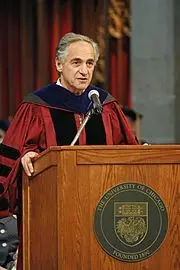面对愈演愈烈的政治正确,芝加哥大学校长站出来,反对言论控制(附英文原文)

最近, 很多美国大学为了【政治正确】搞起了所谓的safeplaces和trigger warning,因此取消了很多受争议人物的演讲,并且还迫使教授修改阅读材料。
Safeplaces指的是为了防止冒犯到学校里的成员,禁止讨论一些富有争议性的话题,而那些备受争议的人物也被禁止带入校园,更别提发表观点了。
而trigger warning指的是当一个观点具有露骨的内容或者具有攻击性时,需要提前告知让读者有选择回避的权利(eg, “以下内容可能让您感到不适”)。
面对【政治正确】这个引起过无数争议的话题,大多数美国大学都采取了非常模糊以及中立的态度。在众多随波逐流躲避争议的大学中,作为一股清流,有一个大学却选择对此绝对不妥协,它就是---【芝加哥大学】。

秋季的新学期即将到来,芝加哥大学给全体新生发了一封信,告知学生,学校反对过度避免人们感到社会不适感的行为。
芝加哥大学的院长John Ellison近日明确指出学校不支持所谓的trigger warning(高能预警),也不能容忍所谓的safeplaces(安全空间)。
芝加哥大学校长Robert Zimmer,在《华尔街日报》发表了一篇关于大学教育的真正意义的文章,其中指出思想自由是真正教育的基础,并坚决反对言论控制。
以下内容,翻译自Robert Zimmer校长的最新演讲。

大学本应是言论自由最该被保障的地方,现在却正在亲自给这种自由制造着巨大的危机。看看最近全美国的校园新闻吧:由于部分学生对演讲者身份感到不满而抗议,许多讲座被临时取消;而另一些讲座则因为同样的原因在中途被几名观众的激烈喊叫给打断。

一些大学生要求教授撤换课堂的阅读材料,只因这些书籍的价值观与他们不合。越来越多人因为发表与大众观点不一致的意见而被迫道歉。在很多情况下,这些妨碍少数人表达意见的行为受到了学校的管理层支持、甚至帮助。
然而,如果缺乏了直面、反思并辩论与不同的观点,从而使学生们的观念在四年之中有所触动,大学教育还有什么意义呢?

我想说的是,大学教育的真正意义就在于,提供一个重要的途径 [此处原翻译为批判性平台,经Talich指正改为重要的途径] 以供学生们来实现自己的潜能,改变家庭的轨迹,并建设一个更加健康、更加包容的社会。
学生们不仅要学习各科的知识,更要学习对他们终生有益的思维方式:学生们要学会理解现象之后的背景、认识到“两害相权取其轻”、学会如何解读数据和建立证据。
他们要掌握如何思考复杂问题,如何为自己的观点辩护,如何反思并重构自己的见解——而不只是一味地迷信自己所持的观点。
学生们会发现,一些看似简单、无可争辩的现象,其实有着非常复杂的文化、历史和环境背景;缺乏深入地了解这些背景是没有办法真正理解社会现象的。他们会意识到,任何行为都有很多方面的影响 ,因而决策绝对不仅仅是选择“错”与“对”那么简单,而是需要冷静地考虑一系列后果、乃至于一系列未知情况,不管它们是否遂人意。

只有亲身收集、分析、解释各种形式的证据来得出意义,学生们才能真正体会到这种复杂性。
他们学着构想社会现实的另一种可能、 去证实或证伪他们自己的假说、去反思大众不假思索就接受的传统观念。
真正好的教育,能给学生充足的思维能力与方法以实现任何人类实践的成功。

如果用一个词来总结大学真正最应该教给学生的东西,那就是“质疑”。正确而有效的质疑要反思、挑战一个证明的全部部分:假设、论据和结论。
它要求我们尊重不同的视角、倾听他人的意见、理解辩论的意义。更根本的一点在于,质疑的最高境界是对自己所持有的观念进行全盘的重新思考,而这往往是最困难的一步。

在这个过程中,没有什么比一个鼓励自由表达意见、鼓励公开交换观的环境更重要的了:只有它才能确保我们没有因为困难而回避最重要的问题、没有因为挑战了我们自己的观点而拒绝从多样化的角度思考。而要营造这样的环境,学生、教员、乃至巡访的演讲者的多样性必须被尊重——身份、思想和经历 。没有这一点,真正的教育不可能存在,而我们学生大学生涯的价值也将严重缩水。

表达意见的自由和思想交流的不受约束并不总是自然存在的:许多人珍视表达自己想法的权利、但却不太重视他人相应的权利。多年来,大学们已经受到来自不同团体的压力, 有的来自校内、有的来自校外,纷纷要求校方禁止一些演讲者,有的是教员、有的是学生、有的来自于校外,发言。

这种施压有时是出于个人或团体不希望其权威性受到质疑,有时是因为有部分人相信自己得特定价值观、理念、观点或方案是绝对正确的,而其他人务必只能听从、不可讨论。
有人说,大学应当是杜绝偏激思想的庇护所,因为观点的冲突和挑战带来的矛盾超过了自由和开放话语的价值。
翻阅史卷,我们看到了达尔文的进化论被禁止讨论、我们看到了麦肯锡时代意识形态压力下的政治禁言、我们看到了无数种族和宗教歧视的排斥行为、我们也看到了各种强加于人民的“道德律令”。

今天一些大学所采取的禁言政策与历史上这些打压思想的行为别无二致。
任何人都不应该因为自己的好恶而尝试妨碍他人发表意见。
大学应该清楚自己的核心教育使命—竭尽全力为学生提供最启迪心灵、丰富人生的教育,而决不能在温和和宠溺之间让我们的学生闭塞了心灵。这意味着,我们必须把质疑和挑战的精神发扬光大。

大学不能被看作是一个舒适的庇护所,而应该是不同思想碰撞、从而让学生们学会在复杂环境中作出明智判断的擂台。
学会挑战信念、扬弃成见是优秀教育的本质性环节;这个过程也许有些痛苦,但只有这样的教育才会让学生能为自己、也为社会,建设出一个精彩的未来。
————————————————————————————————
以上的翻译文一经发布,引发了很多关心美国政治的知友的密切关注。本来把这篇文章发出来,就是供大家参考学习和讨论的,有不同意见和看法的知友都可以发表自己的看法,也非常欢迎知乎网友们能对文中的翻译提出意见和建议。昨天,选。美的主播Talich老师就对文中的翻译提出了不同意见,具体的可以看一下Talich老师最新发表的文章:https://zhuanlan.zhihu.com/p/22304079
对于Talich老师指出翻译“错误”,我们部分接受。有些是明显的错误比如把Critical Pathway[重要的途径]翻译为[批判性的平台],这是翻译的错误,我们也立刻改正了。但有些“错误”我们认为是译者的风格,比如:图片为Talich老师的评论文
对于Talich老师指出的另一些增添文字的问题:
另外,至于其他评论中知乎网友所提出的Citation问题。我们不论在微信公众号上还是知乎专栏上发文都有明确的citation和原文链接。而翻译文章并非都是要把英文原文悉数发布出来,所以只是放了原文链接,挂一下VPN还是很方便就能看到的。
为了消除和避免更多的争议,我们把这篇文章的英文原文全文附在下面。有英文阅读能力强的网友可以直接阅读原文。
Free Speech Is the Basis of a True Education
A university should not be a sanctuary for comfort but rather a crucible for confronting ideas.
By Robert J. Zimmer
Updated Aug. 26, 2016 11:01 a.m. ET
Free speech is at risk at the very institution where it should be assured: the university.
Invited speakers are disinvited because a segment of a university community deems them offensive, while other orators are shouted down for similar reasons. Demands are made to eliminate readings that might make some students uncomfortable. Individuals are forced to apologize for expressing views that conflict with prevailing perceptions. In many cases, these efforts have been supported by university administrators.
Yet what is the value of a university education without encountering, reflecting on and debating ideas that differ from the ones that students brought with them to college? The purpose of a university education is to provide the critical pathway by which students can fulfill their potential, change the trajectory of their families, and build healthier and more inclusive societies.
Students learn not only through the acquisition of specific knowledge, but also through the attainment of intellectual skills that serve them their entire life. Students come to appreciate context, trade-offs and data. They master how to recognize complexity, to argue effectively for their positions and to reconsider and challenge their own beliefs.
Students discover, too, that seemingly straightforward phenomena can have complicated cultural, historical and situational contexts that are critical to understanding their meaning. They realize that actions inevitably have multiple implications and that many decisions involve not simply choosing between “good” or “bad” but evaluating a set of consequences and uncertainties, both desired and undesired.
Students grasp the complexity of collecting, analyzing, interpreting and deriving meaning from evidence of multiple forms. They learn to imagine alternatives, to test their hypotheses and to question the accepted wisdom. A good education gives students the intellectual skills and approaches essential to success in much of human endeavor.
One word summarizes the process by which universities impart these skills: questioning. Productive and informed questioning involves challenging assumptions, arguments and conclusions. It calls for multiple and diverse perspectives and listening to the views of others. It requires understanding the power and limitations of arguments. More fundamentally, the process of questioning demands an ability to rethink one’s own assumptions, often the most difficult task of all.
Essential to this process is an environment that promotes free expression and the open exchange of ideas, ensuring that difficult questions are asked and that diverse and challenging perspectives are considered. This underscores the importance of diversity among students, faculty and visitors—diversity of background, belief and experience. Without this, students’ experience becomes a weak imitation of a true education, and the value of that education is seriously diminished.
Free expression and the unfettered exchange of ideas do not always come naturally. Many people value the right to express their own ideas but are less committed to granting that right to others.
Over the years, universities have come under attack from a range of groups, both external and internal, that demand the silencing of speakers, faculty, students and visitors. The attack is sometimes driven by a desire of an individual or group not to have its authority questioned. Other times it derives from a group’s moral certainty that its particular values, beliefs or approaches are the only correct ones and that others should adhere to the group’s views. Some assert that universities should be refuges from intellectual discomfort and that their own discomfort with conflicting and challenging views should override the value of free and open discourse.
We have seen efforts to suppress discussion of Charles Darwin’s work, to insist upon particular political perspectives during the McCarthy era, to impose exclusionary acts of racial and religious discrimination, and to demand compliance with various forms of “moral” behavior. The silencing being advocated today is equally as problematic. Every attempt to legitimize silencing creates justification for others to restrain speech that they do not like in the future.
Universities should be clear about their core educational mission—to provide students with the most enriching education possible. We cannot shortchange our students. This means that questioning and challenge must flourish.
Universities cannot be viewed as a sanctuary for comfort but rather as a crucible for confronting ideas and thereby learning to make informed judgments in complex environments. Having one’s assumptions challenged and experiencing the discomfort that sometimes accompanies this process are intrinsic parts of an excellent education. Only then will students develop the skills necessary to build their own futures and contribute to society.
Mr. Zimmer is president of the University of Chicago.
(翻译:Yuezhen Li, 编辑:Yuwei)
sources:
http://www.wsj.com/articles/free-speech-is-the-basis-of-a-true-education-1472164801
图片源于网络
更多有关留学和国外大学的新闻与故事可以在【留学生日报App】中阅读,扫描二维码可以开始下载
http://a.app.qq.com/o/ioslink.jsp?id=985918346 (二维码自动识别)





